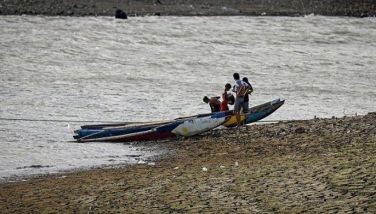Brace for rainy day diseases — DOH

MANILA, Philippines — Ahead of the rainy days, the Department of Health (DOH) is urging the public to get ready for the wet season by knowing how to combat the illnesses associated with it.
According to Health Secretary Francisco Duque III, awareness is the best weapon to prevent contracting various illnesses that are common during the rainy season.
“It is best to arm ourselves with weapons against these diseases even before the onset of the rainy season by building a strong resistance against these illnesses,” Duque said in a statement before the weekend.
Duque noted it is also important to practice “personal hygiene and environmental sanitation” to keep diseases like diarrhea, water-borne diseases such as typhoid fever, cholera, leptospirosis and vector-borne diseases such as malaria and dengue at bay.
Diarrhea is an increase in the frequency of loose or liquid bowel movements usually caused by a variety of bacterial, viral and parasitic organisms.
On the other hand, Duque said typhoid fever is an infectious disease commonly spread through contaminated food and water or through close contact with someone who is infected.
The agency cautioned that cholera is an acute intestinal infection that is common during rainy days because it is caused by food or water contaminated with the bacteria known as Vibrio cholerae.
The bacteria causes watery diarrhea that can lead to severe dehydration and death.
“Diarrhea, typhoid fever and cholera are all food- and water-borne diseases. These can be prevented by drinking water only from safe sources,” he added.
The health chief said if unsure, the drinking water must be boiled or “water chlorination” must be done.
“Cook food well and always have it covered to prevent contamination from flies and other insects. Always wash hands before preparing or handling food and after using the toilet,” he added.
Leptospirosis is a bacterial infection transmitted by many animals, such as rodents and other vermin.
Waste products, such as urine and feces of an infected animal, especially rats, can also contaminate the soil, water and vegetation, especially during floods.
The DOH advised the public to avoid swimming or wading in potentially contaminated flood waters and maintain cleanliness in the house to ensure control of rodents or rats.
The agency also cautioned against dengue fever and dengue hemorrhagic fever, both acute viral infections that are caused by the bite of the dengue-carrying mosquito.
Dengue can be avoided by practicing the 4-S against the disease – search and destroy, self-protection measures, seek early consultation and say “yes” to fogging when there is an impending outbreak or hotspot.
The other disease caused by infected mosquito bites is malaria.
It can be prevented by using long lasting insecticidal mosquito nets, especially during nighttime, and by following the advice of health workers on how to take anti-malaria drugs, Duque said.
- Latest
- Trending





























